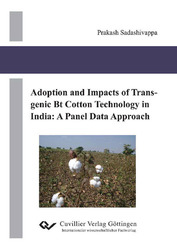| Departments | |
|---|---|
| Book Series (97) |
1383
|
| Nachhaltigkeit |
3
|
| Gesundheitswesen |
1
|
| Humanities |
2379
|
| Natural Sciences |
5409
|
| Mathematics | 228 |
| Informatics | 320 |
| Physics | 980 |
| Chemistry | 1365 |
| Geosciences | 131 |
| Human medicine | 243 |
| Stomatology | 10 |
| Veterinary medicine | 108 |
| Pharmacy | 147 |
| Biology | 835 |
| Biochemistry, molecular biology, gene technology | 121 |
| Biophysics | 25 |
| Domestic and nutritional science | 45 |
| Agricultural science | 1005 |
| Forest science | 201 |
| Horticultural science | 20 |
| Environmental research, ecology and landscape conservation | 148 |
| Engineering |
1799
|
| Common |
97
|
|
Leitlinien Unfallchirurgie
5. Auflage bestellen |
|
Advanced Search
Adoption and Impacts of Transgenic Bt Cotton Technology in India: A Panel Data Approach (English shop)
Prakash Sadashivappa (Author)Preview
Table of Contents, Datei (33 KB)
Extract, Datei (68 KB)
Bacillus thuringiensis (Bt) cotton was introduced in India in 2002 and is the only genetically modified (GM) crop commercially available in
the country. The technology faced enormous arguments before and after the official introduction in the country. The author presents the sustainability of effects over time based on unique panel data set of 5 years generated from 3 waves of survey. The study extends beyond the
traditional farm level analysis by highlighting the advantages of panel data econometrics in studying technology adoption and impacts. Results suggest that Bt cotton technology is very successful in India. The technology has resulted in higher net impacts on cotton yields and
profits. Both small-and large-scale farmers in India are very satisfied with the innovation. Government interventions into pricing of transgenic
seeds and policy implications are discussed.
| ISBN-13 (Printausgabe) | 3869551151 |
| ISBN-13 (Hard Copy) | 9783869551159 |
| ISBN-13 (eBook) | 9783736931152 |
| Language | English |
| Page Number | 184 |
| Edition | 1 Aufl. |
| Volume | 0 |
| Publication Place | Göttingen |
| Place of Dissertation | Universität Hohenheim |
| Publication Date | 2009-10-07 |
| General Categorization | Dissertation |
| Departments |
Agricultural science
|








